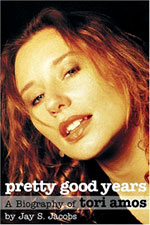- Articles
- Cherries
- Minutiae
- Q&A
- RAINN
- Releases
- Reviews
- Site News
- Them
- Toriphiles
- Touring
- TV/Radio/Web
- Video
News Archives
Keep an eye on our Twitter and Facebook pages since we often post quickie updates there when we're on-the-go.
During tours, we do our best to cover setlists in real-time on Twitter. If you want to tweet a show in, just DM or @ us on the day and tell us to watch your stream that night.
Tori is touring in 2017 to support the release of Native Invader. The European legs runs from early September through early October and the North American leg runs from late October to early December. We do not know if additional dates elsewhere will be added.

Native Invader (album, 2017)

Unrepentant Geraldines (album, 2014)

Gold Dust (album, 2012)

Night of Hunters (album, 2011)

Midwinter Graces (album, 2009)
 Abnormally Attracted To Sin (album, 2009)
Abnormally Attracted To Sin (album, 2009)
Live at Montreux 1991/1992 (DVD, 2008)

American Doll Posse (album, 2007)

A Piano (boxed set, 2006)

Pretty Good Years
(bio, 2006)

Fade To Red
(DVD, 2006)
 Comic Book Tattoo (book, 2008)
Comic Book Tattoo (book, 2008)News: The Paste Review of A Piano
RaspySwirl tells us that the November issue of Paste includes a review of A Piano. Thanks to Jenn and RaspySwirl for sending scans and transcripts of this article!
The Paste Reckoning
Reissues
The Keys to Understanding
Tori Amos rescued the piano ballad from the ruins of diva-pop. Have you forgotten?
By David Mead
Outside the legions of awestruck fans that gather for her furor-inducing performances, opinions about Tori Amos’ import and legacy are decidedly mixed. Erica Jong on piano? The female Robert Plant? Kate Bush on speed? Not quite any one in particular, but possibly a jarring mixture of all these and more. As the ‘90s rise into sharp relief against the lugubrious gesturing of culture-show pundits, Amos stands triumphant in the murky depths of her origins. Her new box set, A Piano: The Collection, aims to prove the point, once and for all.
Amos might’ve single-handedly inspired the term “Vagina Music,” and accolade she would most likely balk at in spite of its linguistic debt to her cultural impact. Her solo debut, 1992’s Little Earthquakes, birthed a massive sea change in the then-tremulous position of female singer/songwriters. It surfaced in a musical scene dominated by Paula Abduls and Mariah Careys, when the practice of a female artist stepping onstage to present herself as an open wound seemed lost in a galaxy far, far away.
The album’s emotional centerpiece was a harrowing a cappella number entitled “Me and A Gun,” and unflinching first-person description of a rape Amos suffered in 1989. Eyes closed and glasses of chardonnay in hand, women of every variety nodded along to the rapturous vibrato outlining the pitfalls of an emotionally abusive relationship in “Silent All The Years.” And Bubbas everywhere nervously rolled their T-shirt sleeves a bit tighter around their Marlboro packs in anticipation of a confrontation with their newly empowered lady friends.
Two distinct categories of female singer/songwriter emerged from this moment. One begins with Alanis Morissette and bleeds into all of the Vanessas, Michelles andAshleys currently curled up in the corner of a studio, freely exorcising their demons to the cheers and chagrin of billions of listeners. The other starts with Paula Cole, slow-burning into Fiano Apple, Chan Marshall and the Dresden Dolls. Amos can be alternately thanked and/or chided for unintentionally ushering brazen self-examination back into the mainstream. Little Earthquakes was everything a great debut is supposed to be: gorgeous and focused, the realization of a career-bearing talent.
Disc One of Piano offers an extended, re-sequenced and (occasionally) remixed version of Earthquakes. Highlights include an alternate mix of the B-side “Flying Dutchman” and the Bo Diddley-on-a-date-with-Deborah Winger-esque “Sweet Dreams.” One of the most compelling reasons for fans to lay out the 76 bucks for this new collection is Amos’ exceptionally candid liner notes, in which she details these songs’ inception and the painful process of convincing her record label of their validity in the aforementioned marketplace.
Disc Two plucks most of its best moments from Amos’ next two efforts, 1994’s Under the Pink and 1996’s Boys for Pele. Building on the aesthetic and narrative qualities of Earthquakes, Under the Pink amplifies Amos’ breadth of composing and arranging abilities. Tracks like “Cornflake Girl” wrap her voice and formidable piano skills in a slinky groove that belies the confrontational aspects of her lyrics while effortlessly emphasizing their inherent sexuality. Pele is a transitional moment, the sound of an artist trying to stretch and reinvent herself. “From where I sit right now… I can honestly say that I do not know where I would be if I had not made Boys for Pele,” Amos opines in her liner notes. “Blood Roses” is an excellent example of this catharsis, a song that benefits, suffers and, ultimately, endears itself because of its shaky foundation. A mind-blowing live version of “Professional Widow” serves as a reminder of the power of Amos’ live performances.
The previously unreleased and alternate versions of songs featured on Piano are sprinkled throughout its five discs, usually out of chronological context with the original sessions for which they were recorded (the exception being disc five, comprised entirely of B-sides and alternate takes). Amos makes the case that these decisions were based on the sonic qualities of the recordings; fair enough, that is, until the shrink is torn off Disc Three. The wince-inducing qualities of “Armand’s Star Trunk Funkin’ Mix” of “Professional Widow” could spark empathetic peals of laughter if not occurring in the middle of a Tori Amos box set. The suspension of irony the music requires is suddenly shattered, and we are left to ashamedly pick up the pieces. Disc Three also breaks a cardinal rule of compilations by regurgitating rarities from another “greatest” collection, 2003’s Tales of a Librarian. Though this new disc is partially redeemed by the inclusion of key tracks from the underrated To Venus and Back.
Hitting eject and moving on, listeners can proceed into the calm, clear waters of Disc Four, which features the welcome expansion of Amos’ last three albums, 1998’s From the Choirgirl Hotel, 2002’s Scarlet’s Walk and 2005’s The Beekeeper. These albums prove beyond a doubt that Amos is the rare artist that, despite achieving international superstardom, has continued to delve inward without betraying her initial awareness of her audience. A Piano: The Collection is hardly flawless, but leaves the distinct impression that its author is a comfortable with its pock marks as its beauty marks, a decidedly attractive quality.


